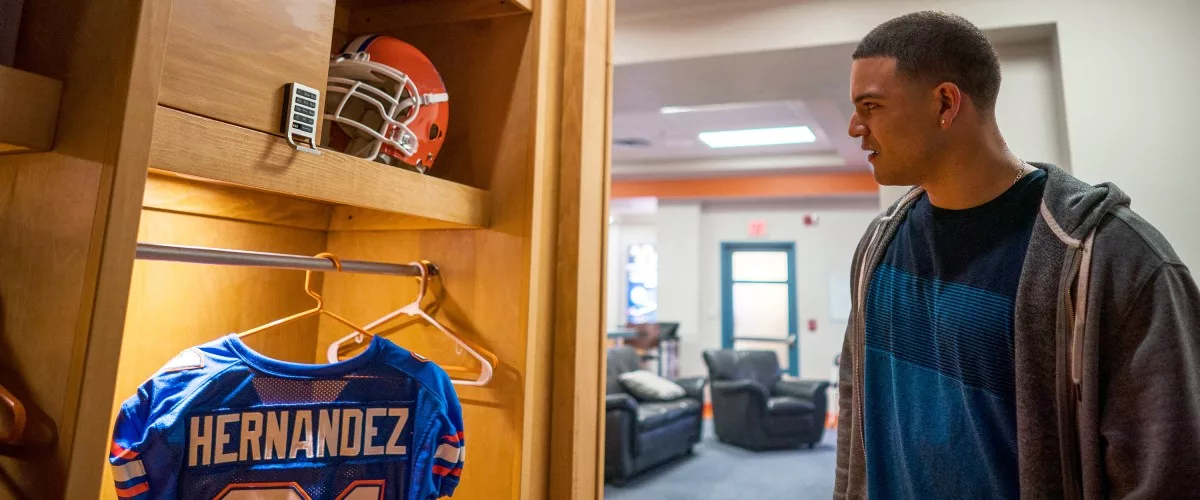In his three seasons with the New England Patriots, Aaron Hernandez scored eighteen touchdowns and almost two thousand yards receiving. In college, Hernandez earned first-team All-American honors and was part of the Florida Gators during a run that led to a National Title. For all his accomplishments and the numbers he put up during his career, he will only be remembered for one– the murder of Odin Lloyd. “American Sports Story: Aaron Hernandez” details the rise and fall of former NFL player Aaron Hernandez. Multiple documentaries have been made to discover what drove Hernandez to murder because it’s hard to fathom what would make a man throw away millions of dollars and a life of luxury. All he ever wanted to do was play in the NFL. How could it end up like this?
This series is based on the Wondery and Boston Globe podcast, “Gladiator: Aaron Hernandez & Football, Inc.,” but represents the first time Hernandez’s story has been dramatized with actors. In addition to Hernandez being played by actor Josh Andres Rivera, many familiar faces are shown, including Hernandez’s coaches– Florida’s Urban Meyer and New England’s Bill Belichick. Mostly, these familiar faces are distracting, if not outright hilarious. It’s difficult to take Hernandez’s plight seriously when Belichick is seen singing along to Bon Jovi’s “It’s My Life.” Thankfully, “American Sports Story” decides to keep appearances from teammates Gronkowski and Brady to a minimum.
“American Sports Story” paints the picture of an athlete who was encouraged to play through injuries, including perhaps multiple undiagnosed concussions. He was also trying to hide his true identity in a hyper-masculine environment, which would never have accepted who he was. In the two-episode premiere, “American Sports Story” lays the groundwork for Hernandez’s fear of being perceived as a gay man. His father Dennis Hernandez, is depicted as an abusive man– often belittling Hernandez and his brother when they weren’t living up to his lofty expectations. Even though Hernandez was frightened by his father, he also idolized him. The dream of playing in the NFL, the league “that owns their own day, that they stole from Church,” is the only thing that matters. The NFL is also a place for “men,” as Hernandez’s father puts it, a word in this case that has respectability and a certain kind of attitude. Hernandez often struggled with being the man his father wanted him to be– he couldn’t conform to the masculine public persona without burying who he truly was.
Another overarching element of “American Sports Story” examines the institutions that allowed Hernandez to believe he was above the law. There’s little doubt that his battles with CTE and his sexuality are attributed to his fear and decision-making ability. Arguably the University of Florida, The NFL, and the New England Patriots all share culpability in the man he eventually became. “American Sports Story” is not only interested in why a football player with all this money and status could commit murder but, ultimately, the experiences that led to that.
Credit to Rivera for portraying such a complicated and well-known athlete and sinking into the depths of that portrayal. His performance of Hernandez is the strongest selling point of “American Sports Story,” as he showcases the different personas that Hernandez might’ve shared. Outside of the lead performance, the women of the series come off a lot better than the many famous faces. In the penultimate episode, “What’s Left Behind,” Hernandez’s fiancé Shayanna Jenkins (Jaylen Barron), his mother Terri (Tammy Blanchard), and his cousin Tanya Singleton (Lindsay Mendez) face the fallout of his arrest and decide how they’ll be defined. Barron’s character, in particular, has a dilemma–while she’s only Hernandez’s fiance, she must decide whether she’ll continue to be in his corner or turn her back on him like so many others have done before.
Even though “American Sports Story” has compelling drama to tap into, it never exceeds the level of a Lifetime series– the abusive father figure, the absent mother, and a group of friends that pushed Hernandez towards dangerous substances. While these events very likely played out in real life as depicted in the show, so much of it feels manufactured to hit a checklist. Did Hernandez hook up with men during his time in Florida? Maybe. Was he suicidal at other times of his life? There’s no way of knowing. What should be the most intriguing event in the entire run, Hernandez’s relationship with Odin Lloyd and the subsequent murder, fails to live up to expectations.
Hernandez committed murder, perhaps even multiple times, but the series wanted to solve another crime– who was it that killed Aaron Hernandez? Was it the University of Florida that allowed him to get away with multiple crimes with no punishment? Was it the New England Patriots, who knew they were taking in a troubled young man and didn’t provide him with the needed resources? Maybe it was his family life? The reality is that it was probably a combination and not any one thing. Rivera does an admirable job of showing Hernandez’s many sides. Still, much of what is here is either a retread of previous documentaries or not compelling enough to merit a 10-episode miniseries. Not to mention that many famous faces’ casting choices are woefully inadequate and distracting. Ultimately, “American Sports Story” wants to provide an entertaining glimpse into the fall of a modern professional athlete. Maybe they’ll find the entertaining part next season because this one is no good.
The 10-episode mini-series was screened for review. Airs weekly on FX.



















